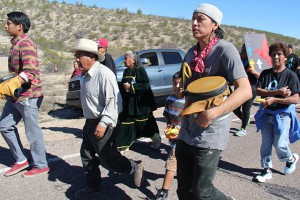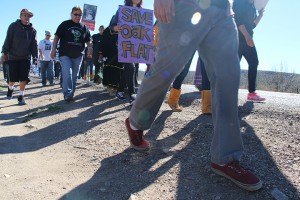- Slug: BIZ-Oak Flat, about 1,000 words
- Photos available (thumbnails, cutlines below)
- NOTE: Additional images available. Please contact christina.leonard@asu.edu.
By CARINA DOMINGUEZ
Cronkite News
SAN CARLOS – Dozens of people sang, danced and prayed outside the San Carlos Apache tribe’s office on Thursday morning before heading out on a 44-mile journey they hope will protect their ancestral lands at Oak Flat campground.
The protesters organized the march to express their anger over a federal land exchange that gave a copper mining company permission to mine land sacred to the Apache people.
“I prayed about having my sunrise dance (a womanhood ceremony) there,” said Nizhoni Pike, 14, a member of the tribe who joined the march. “I grew up going there, praying there.”
The two-day march will end at Oak Flat campground in southeastern Arizona, where Resolution Copper Mining plans to break ground on a $61.4 billion mining operation by mid-2020, according to its website.
Resolution Copper officials did not return a call seeking comment, but elected officials previously have said the project will bring much-needed jobs to the area.
The campground is not on the reservation, but the land holds cultural significance to the Apache people.
Protesters plan to occupy the Oak Flat area for “however long it takes,” said Vernelda Grant, the director and tribal historic preservation officer for the San Carlos Apache Historic Preservation Archaeology Department.
In December, the federal government authorized the land swap as part of the National Defense and Authorization Act, which continued funding for the Defense Department.
The legislation gave Phoenix-based Resolution Copper 2,400 acres of copper-rich land in and around the Oak Flat campground. In return, the company will transfer roughly 5,300 acres of privately owned parcels of conservation land scattered throughout Arizona to the U.S. Forest Service.
Arizona Sen. John McCain touted the legislation to Cronkite News, saying “Arizona is the largest copper-producing state in the nation, which is why support for this legislation remains strong in my home state.”
But tribal members said the government never consulted the tribe.
“This is a human and religious-rights issue, and it’s undermining tribal sovereignty if this continues,” said Wendsler Nosie Sr., a tribal council member of the San Carlos Apache’s Peridot District. “The U.S. can still make these corrections.”
Grant added that the tribe’s connection to the land “is a part of something that greatly makes us who we are.”
The legislation authorizing the land swap specified that the Secretary of Agriculture would consult with “affected Indian tribes.”
However, San Carlos Apache Chairman Terry Rambler said government officials have not valued the tribe’s concerns.
Rambler previously told Cronkite News that “meaningful consultation” would have meant the tribe had an opportunity to change the outcome. But in this case, “we’re just like a check mark in the process.”
Resolution Copper anticipates $20 billion in local, state and federal tax revenues over the 64 year life of the mine, according to its website.
The site also said the mining project will support 1,430 direct jobs and will create opportunities locally, regionally and statewide.
However, Nicole Horseherder, 45, a community organizer from Black Mesa who has led environmental protests, said she doesn’t believe Resolution Copper has considered the human or environmental costs.
“Tribal leaders need to look at everything, not just how economists calculate the costs,” she said. “It’s not a comprehensive viewpoint. An indigenous perspective will give you the real costs, the human costs.”
“You want jobs that are not going to hurt your people. You want to be proud of the revenue,” Horseherder added.
Nosie said the protest has garnered attention from people around the world from places where the company operates other mines, particularly those that affect indigenous people in places like Africa, Brazil and Australia, where Resolution Copper Mining’s parent company Rio Tinto is based.
“It’s really devastating to the rest of the world,” Nosie said.
^__=

Dozens of protesters march along Route 6 on Thursday to express their anger over a federal land exchange that gave a copper mining company permission to mine land sacred to the San Carlos Apache people. (Cronkite News photo by Carina Dominguez.)
^__=
The two-day march will end at Oak Flat campground in southeastern Arizona, where Resolution Copper Mining plans to break ground on a $61.4 billion mining operation by mid-2020, according to its website. (Photo by Carina Dominguez)
